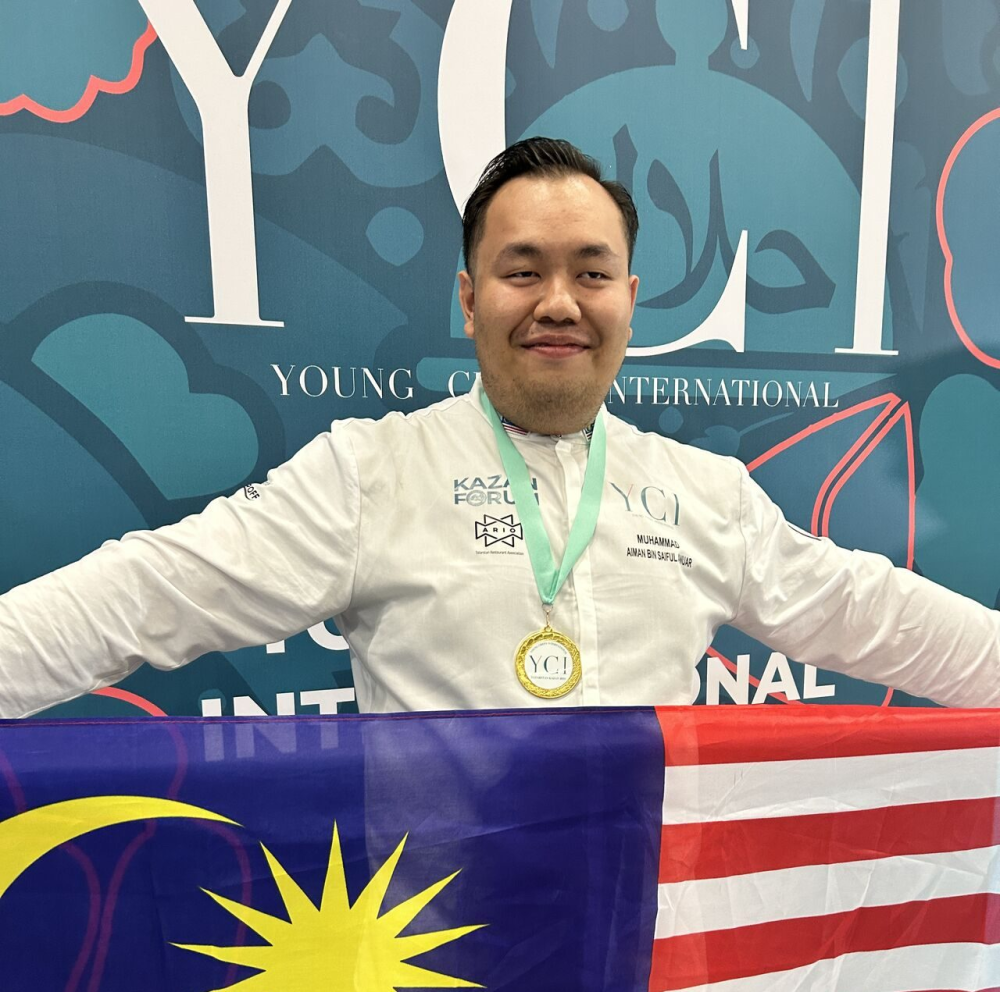KUALA LUMPUR - Malaysia’s cuisine was a big hit at an international culinary competition in Kazan, Russia, with dishes inspired by a young Sarawakian chef winning a gold medal, and Malaysia’s all-time favourite nasi lemak emerging as the best-selling item at the event.
The culinary competition was part of the XV Russia-Islamic World KazanForum 2024: International Economic Forum of Russia and Organisation of Islamic Cooperation (OIC), held from May 14 to May 19.
Sarawak-born Muhammad Aiman Saiful Anuar, who is a culinary art lecturer and a student pursuing a Masters degree in International Hospitality Management at UCSI University’s Faculty of Hospitality and Tourism Management, clinched a gold medal in the View Without Borders category at the Young Chefs International Culinary competition.
Alongside Aiman, 24, young chefs from 13 Islamic countries including Azerbaijan, Russia, Egypt, Morocco, Tunisia, Uzbekistan, Lebanon, Kyrgyzstan, Kazakhstan, Senegal, Algeria, and Iran also took part.
The chef from Miri prepared the delectable dishes inspired by the Land of The Hornbills’ rich culinary heritage.
The winning dishes were umai udang (a prawn-based dish) for starters; fish in percik sauce, ayam bergedil dan serunding (cutlets and floss made from chicken), acar jelatah (a type of pickle), and sambal (condiment mainly made of chilies) for the main course.
He wrapped up his offering with a dessert unique to Sarawak, sagu gula apong (sago with nipah palm sugar syrup) with mango puree, diced mango, and coconut foam, along with tebaloi (Melanau sago biscuit).
His trainer, Assistant Professor Chef Mohamad Fadzly Che Omar, who is also the deputy dean of the faculty and a Sarawakian himself, was there as well to lend a helping hand.
Speaking to BERNAMA, Aiman said Sarawak fare was chosen for the competition as it represented many of Malaysia’s natural flavours. For example, umai udang uses serai (lemongrass) and bunga kantan (torch ginger).
He regarded his victory in Russia as surreal and special that even now, thinking about it still brings tears to his eyes.
"I had a lot on my plate. I was juggling between my work as a chef lecturer, a master’s student, a business owner, and a trainer for the UCSI culinary team. But from the bottom of my heart, I want to thank my mentor Chef Mohamad Fadzly; he is the main reason that I received this medal,” he added.
Fadzly, who is also Deputy President of the Gastronomy Association of Malaysia, and Aiman also did some research on the Russian palate before preparing the menu that would appeal to Russians.
Meanwhile, the other Malaysian delights offered at Malaysia’s food booth at KazanForum included unleavened bread with salmon tartare as the appetizer; a main dish of nasi lemak with prawn sambal; pickled daikon, carrot, and cucumber as a salad; sagu gula Melaka with mango as dessert, as well as hot masala tea. All these, presented in bento boxes at the Malaysian booth, were quickly sold out during the three-day event.
Another bento box of Malaysian cuisine included a salad made of shrimp, mango, tomato, avocado, and kimchi sauce, along with braised veal and mashed potato with coconut; sagu gula Melaka dessert, as well as masala tea.
Vegans and vegetarians too were not forgotten. A bento box with pickled daikon, carrot and cucumber salad; nasi lemak with marinated tofu, cucumber, and peanuts; sagu gula Melaka dessert; and masala tea with coconut milk were made available.
Adding flair to the gastronomy event, Russian youths assisting at the Malaysian booth were spotted wearing batik sarongs while serving guests who were exploring Malaysia’s culinary offerings.
President of the Gastronomy Association of Malaysia, Chef Rossham Rusli, who was also a jury member in the competition, expressed delight over the overwhelming response to Malaysian cuisine with over 100 bento boxes sold daily. He described the feat as a 'tsunami sale.'
Rossham, who is also the secretary-general of the World Platform of Islamic Countries Culinary Societies and the leader of the Malaysian culinary team in the event, said some ingredients to prepare Malaysian dishes for sale in Kazan were sourced locally while some were brought from Malaysia.
The executive chef at Nilai Springs Resort Hotel said some adjustments and local ingredients were utilised to suit the Malaysian dishes according to the Russians' taste buds.
For example, the nasi lemak sold in Russia is cooked using the rice used in risotto instead of the rice from Malaysia, while the shrimp used for sambal udang is sourced from Russia.
Masala tea is chosen as the add-on drink due to the unavailability of tea dust and condensed milk similar to the ones in the Malaysian market, while for sagu gula Melaka a local version of the sago was used, Rossham added.
On the host side, Board of the Tatarstan Restaurant Association Chairman Chef Mikhail Sharipov noted a significant shift in this year's competition, with finalists' country dishes sold to guests, unlike previous competitions where only judges could taste them.
With this new format, each country cooperated with local restaurants in Kazan in preparing the respective national food. "My restaurant, Skazka, located on Bauman Street in Kazan, teamed up with the Malaysian delegation in introducing Malaysian cuisine to the guests," he added.
Sharipov expressed his pleasure in working with the Malaysian culinary team in preparing Malaysian food to be introduced at the forum.
He is ever ready to introduce Malaysian food in his more than 50-year-old restaurant in Kazan, which was started by his father, and he invites any Malaysian investors interested in the business to cooperate with him.
Russian businesswoman Natalia Trofimova, when met at the event after she tried one of the Malaysian bento boxes, said her favourite is the sagu gula Melaka dessert. - BERNAMA


